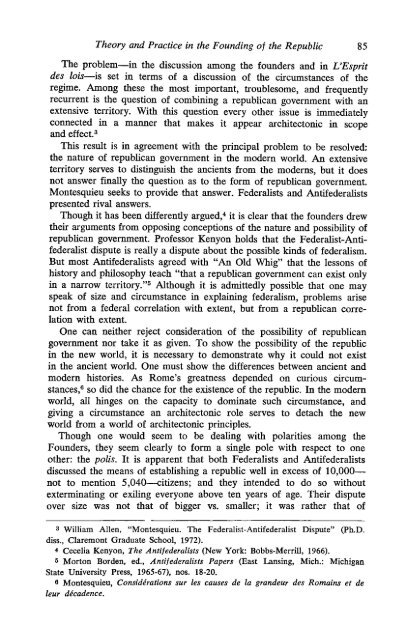philosophy - Interpretation
philosophy - Interpretation
philosophy - Interpretation
Create successful ePaper yourself
Turn your PDF publications into a flip-book with our unique Google optimized e-Paper software.
The problem<br />
Theory and Practice in the Founding of the Republic 85<br />
in the discussion among the founders and in L'Esprit<br />
des lois is set in terms of a discussion of the circumstances of the<br />
regime.<br />
Among these the most important, troublesome, and<br />
frequently<br />
recurrent is the question of<br />
combining a republican government with an<br />
extensive territory. With this question every other issue is immediately<br />
connected in a manner that makes it appear architectonic in scope<br />
and effect.3<br />
This result is in agreement with the principal problem to be resolved:<br />
the nature of repubhcan government in the modern world. An extensive<br />
territory serves to distinguish the ancients from the moderns, but it does<br />
not answer<br />
finaUy the question as to the form of repubhcan government.<br />
Montesquieu seeks to provide that answer. Federalists and Antifederalists<br />
presented rival answers.<br />
Though it has been differently<br />
argued,4<br />
it is clear that the founders drew<br />
their arguments from opposing conceptions of the nature and possibihty of<br />
republican government. Professor Kenyon holds that the Federalist-Antifederalist<br />
dispute is really a dispute about the possible kinds of federalism.<br />
But most Antifederalists agreed with "An Old Whig" that the lessons of<br />
history and phUosophy teach "that a repubhcan government can exist only<br />
in a narrow territory."5 Although it is admittedly possible that one may<br />
speak of size and circumstance in explaining federalism, problems arise<br />
not from a federal correlation with extent, but from a repubhcan corre<br />
lation with extent.<br />
One can neither reject consideration of the possibUity<br />
government nor take it as given. To show the possibUity<br />
of repubhcan<br />
of the republic<br />
in the new world, it is necessary to demonstrate why it could not exist<br />
in the ancient world. One must show the differences between ancient and<br />
modern histories. As Rome's greatness depended on curious circum<br />
stances,6<br />
so did the chance for the existence of the republic. In the modern<br />
world, aU hinges on the capacity to dominate such circumstance, and<br />
giving<br />
a circumstance an architectonic role serves to detach the new<br />
world from a world of architectonic principles.<br />
Though one would seem to be deahng with polarities among the<br />
Founders, they seem clearly<br />
to form a single pole with respect to one<br />
other: the polis. It is apparent that both Federalists and Antifederalists<br />
discussed the means of<br />
establishing<br />
a republic weU in excess of 10,000<br />
not to mention 5,040 citizens; and they intended to do so without<br />
exterminating or exUing<br />
everyone above ten years of age. Their dispute<br />
over size was not that of bigger vs.<br />
smaUer; it was rather that of<br />
3 William Allen, "Montesquieu. The Federalist-Antifederalist<br />
Dispute"<br />
diss., Claremont Graduate School, 1972).<br />
* Cecelia Kenyon, The Antifederalists (New York: Bobbs-Merrill, 1966).<br />
(Ph.D.<br />
5 Morton Borden, ed., Antifederalists Papers (East Lansing, Mich.: Michigan<br />
State University Press, 1965-67), nos. 18-20.<br />
6 Montesquieu, Considerations sur les causes de la grandeur des Romains et de<br />
leur decadence.
















